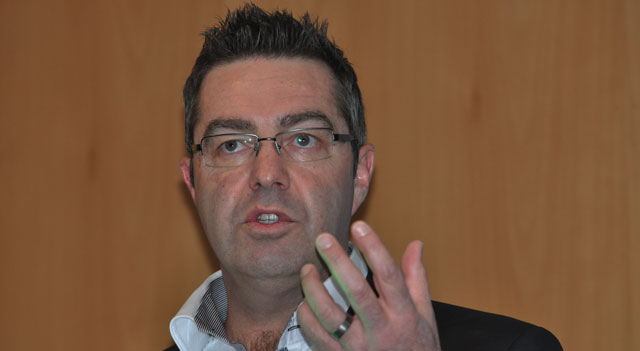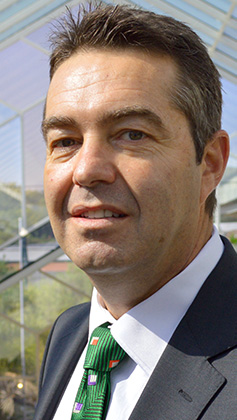
Banking systems have not typically made for riveting conversation outside of business IT circles. Today, however, banks, including those in South Africa, are doing some of the coolest things in the technology field.
Nedbank’s low-slung building at the top of Katherine Street in Sandton has been the company’s technology and operations nerve centre since the mid-1980s, and it’s here, in a swanky corner office, that I sit down with the bank’s chief information officer (CIO) Fred Swanepoel, 49, to talk about some of the interesting things it’s doing with technology and to find out more about his career and interests.
Although its core banking systems are still pivotal to everything Nedbank does, the bank is trying to differentiate its offerings by making greater use of technology at the client-facing front end, too. Last year, it took the wraps off an Innovation Lab, an in-house facility that allows employees to experiment with new technologies and to trial new product ideas.
Nedbank has a long history of harnessing technology in banking. And consumers have taken to it. Indeed, its mobile banking application was recently used by a business customer for a single, R500m transaction.
Swanepoel says Nedbank has always regarded the mobile phone as a revolutionary device in banking — indeed, the bank once owned its own cellular service provider, Nedtel Cellular.
The bank has certainly come a long way since 1964, when it was the first local bank to introduce computerised banking services. In that year, its Fox Street branch was the first to go live on an NCR computer. The machine had just 5KB of handmade core memory and came installed in three cabinets and a console section to house the power supply.
Swanepoel has come a long way, too.
“I grew up on a farm on the West Rand,” Swanepoel says after we settle in for the interview. His grandparents owned the farm and it was through them that he got his first exposure to the business world.
“In 1950, they started a greeting-card publishing business, the remnants of which can been seen in Cardies today,” he recalls.
“Helping out over holidays was just part of growing up. My earliest memories were of folding the cards for Christmas and Valentine’s Day.”
After school, Swanepoel was called up for a year of compulsory military service. “I was called into the Signals Corps, and it was there that I had early experience of things like radio communication.”
After his year in the army, Swanepoel enrolled at Stellenbosch and completed a BCom (Hons) majoring in financial accounting. He also received his first job during his honours year — working with a colleague on an accounting project at one of area’s many wineries.
Around the same time, Swanepoel became involved in establishing the university’s first computer centre, which entailed the roll-out of IBM’s then brand new personal computer. He even helped develop the IT curriculum for second year BCom accounting students.
A stint at the Small Business Development Corporation — today known as Business Partners — in Johannesburg as a business advisor followed. He later ended up in the accounting department, which was struggling to implement a new general ledger. With a rudimentary knowledge of programming, he stepped in to assist. That didn’t work out terribly well, so a bigger project, to develop a full-fledged enterprise resource planning system, was born. This involved rewriting all of the business systems.

Swanepoel eventually worked his way into the CIO role, where he stayed until 1996.
During this time, he completed his MBA through Wits and was approached by a number of companies, eventually settling on an offer from Nedbank, where he would work alongside then-CIO Barry Hore and Len de Villiers, who succeeded Hore as CIO.
He says the two men recognised there would be convergence between telecommunications, banking and IT about a decade before it happened.
At the time, Nedbank had invested in a range of tech companies, including Dimension Data, Nedtel Cellular and Net1 UEPS Technologies. But in 2000 the technology bubble burst.
“Instead of Nedbank investing in its core business, it had made a big bet on technology, and the core business suffered as a result.”
After the merger with BoE in 2002, BoE CEO Tom Boardman was appointed as executive director (becoming Nedbank CEO the following year). Boardman made a call that the bank go back to basics and, as a result, it disposed of its tech investments. The bank was decentralised, reversing changes that had been driven under Hore.
In the same year, Swanepoel was asked to manage IT integration of the merged Nedbank and BoE business.
“This was a big task,” he says. “We had to take nine entities and merge them into one system. We had over a thousand banking systems — the initial integration was to bring that down to 400, and we now have 160, with our target in 2014 to bring them down to 60.”
Promoted to CIO
Swanepoel was instrumental in launching Internet banking for retail and wholesale customers in 2007.
That same year, Nedbank sent Swanepoel to the US to complete Harvard Business School’s advanced management programme.
Eleven months after returning to South Africa, in November 2008, he was appointed as CIO following the resignation of De Villiers, who is now CIO at Telkom (by way of a similar role at Absa).
On the future of banking, Swanepoel tells me there are two possible outcomes. “If banks do not innovate fast enough, they will be relegated to doing what they did in the past: they’ll be back-office processors doing things like transactions and loan applications.”
But if they can stay ahead of the innovation curve, they can stop what he calls “shadow banking organisations” from “disintermediating” them.
“If banking can reinsert itself into those spaces that have been taken by some of these third parties, there is a very bright future for us.”
Choosing whether to compete or partner is going to be key in whether banks are successful, he says.
Swanepoel is big fan of Apple and owns most of the technology the company makes. He uses it throughout his Houghton home, he says.
This is far removed from the BlackBerry Bold smartphone he loved so much when he first stepped into the CIO role.
All his gear, he says, is connected via a 10Mbit/s broadband digital subscriber line. But he is excited about the arrival of home fibre broadband from Telkom.
“I know both the CIO [ex-boss De Villiers] and Telkom CEO Sipho Maseko, so I joke about it to them about this, but they’ve promised I will receive one of the first fibre-to-the-home connections in Houghton.”
All the better to innovate with, then. — © 2014 NewsCentral Media

